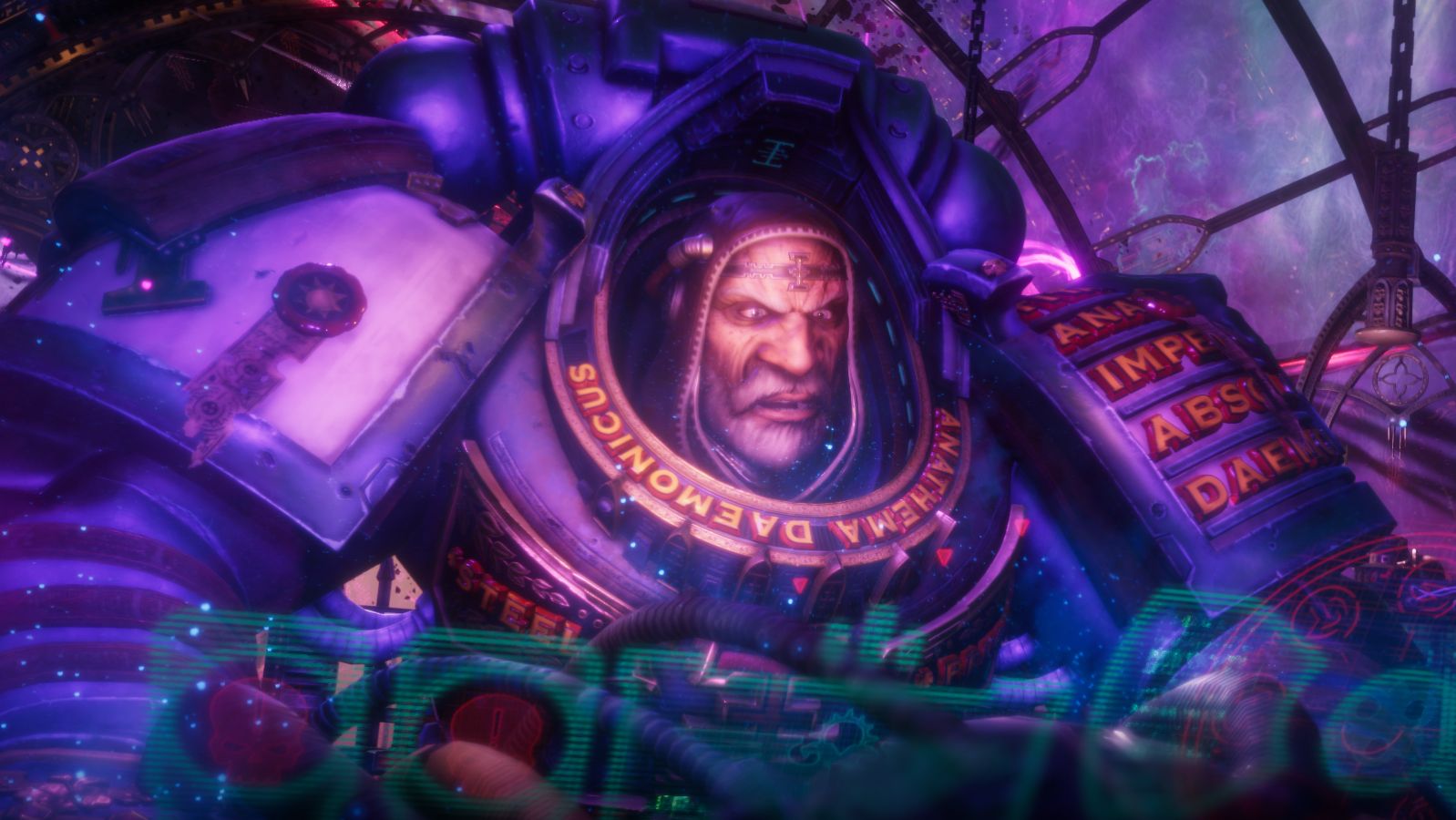Our Verdict
A layered and engaging space opera that triumphs both on and off the battlefield.
PC Gamer's got your back
What is it? A turn-based tactics game about combating a cosmic plague.
Expect to pay £35/$45
Release date May 5, 2022
Developer Complex Games
Publisher Frontier Foundry
Reviewed on Ryzen 7 5800H, Nvidia GeForce 3070 (mobile), 16GB RAM
Multiplayer? No
Link Official site
Grand Master Kai looms over my crew via hologram like an enraged Greek cybergod. It's our bimonthly report and he's not happy. Our onboard Inquisitor's desire to procure knowledge about the Nurgle plague has inadvertently accelerated its spread, and he wants to know who's responsible. Do I cover up for Inquisitor Vakir and piss off Brother Ectar, revered captain of the Grey Knights Space Marine Chapter, or do I throw the brash Inquisitor under the bus? Whatever I do, someone will be unhappy, and that will have knock-on effects.
I go for the third option: tell the Grand Master that the mission is going exactly as planned. He buys it, and seeing as we're doing so well in our campaign (which we're really not) he diverts our requisitions and armoury access to some other chapter that needs them more. My reluctance to attribute blame has meant I've stayed onside with my crewmates, but have also ensured that the next two months of our campaign are going to be particularly gruelling.
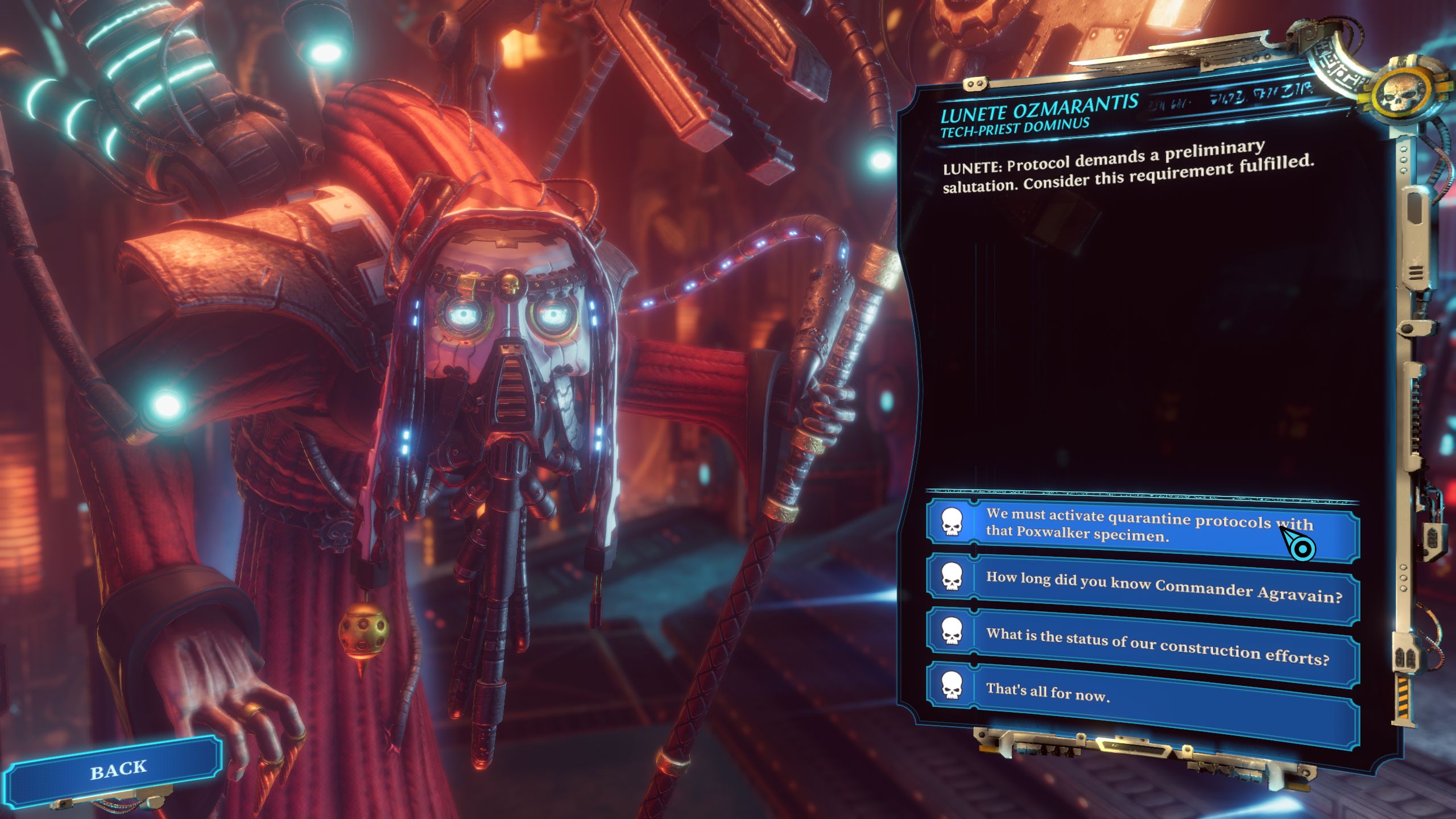
And here I was thinking that Daemonhunters would be a straightforward turn-based tactics game, content to tweak those sturdy XCOM foundations for the marketable mythos of Warhammer 40,000. Yes, you'll spend most of your time on the battlefield, hopping between planets in four-man cracksquads to combat a cosmic pox propagated by the Plague God Nurgle. But while Daemonhunters executes its combat very well, it also succeeds at all the stuff between the missions.
There is schmoozing, politicking and appeasement, space battles and text-based events, research and ship repair. You pick the pace at which you progress through the campaign, you balance the conflicting interests of your frustrated, fractious crew. You're an active character in a compelling well-written space opera, and your decisions as commander of the good ship Baleful Edict are just as important as your feats in battle.
Each crewmate on the upper decks of the Baleful Edict—the actual marines are presumably locked away in their barracks—has their own priorities within the larger conflict. Brother Ectar is a resolute Grey Knight veteran who's fiercely loyal to his fellow marines. Vakir, meanwhile, is an arrogant but dedicated Inquisitor, who believes that marines are expendable tools in the mission to understand and stop the Bloom. Then there's Lucete, the charmingly robotic Tech-Priest who'll often interrupt the other two's squabbling while preaching the importance of non-emotion (though you can also frazzle his wires by making decisions that jeopardise the safety of the ship he's responsible for restoring to its former glory).
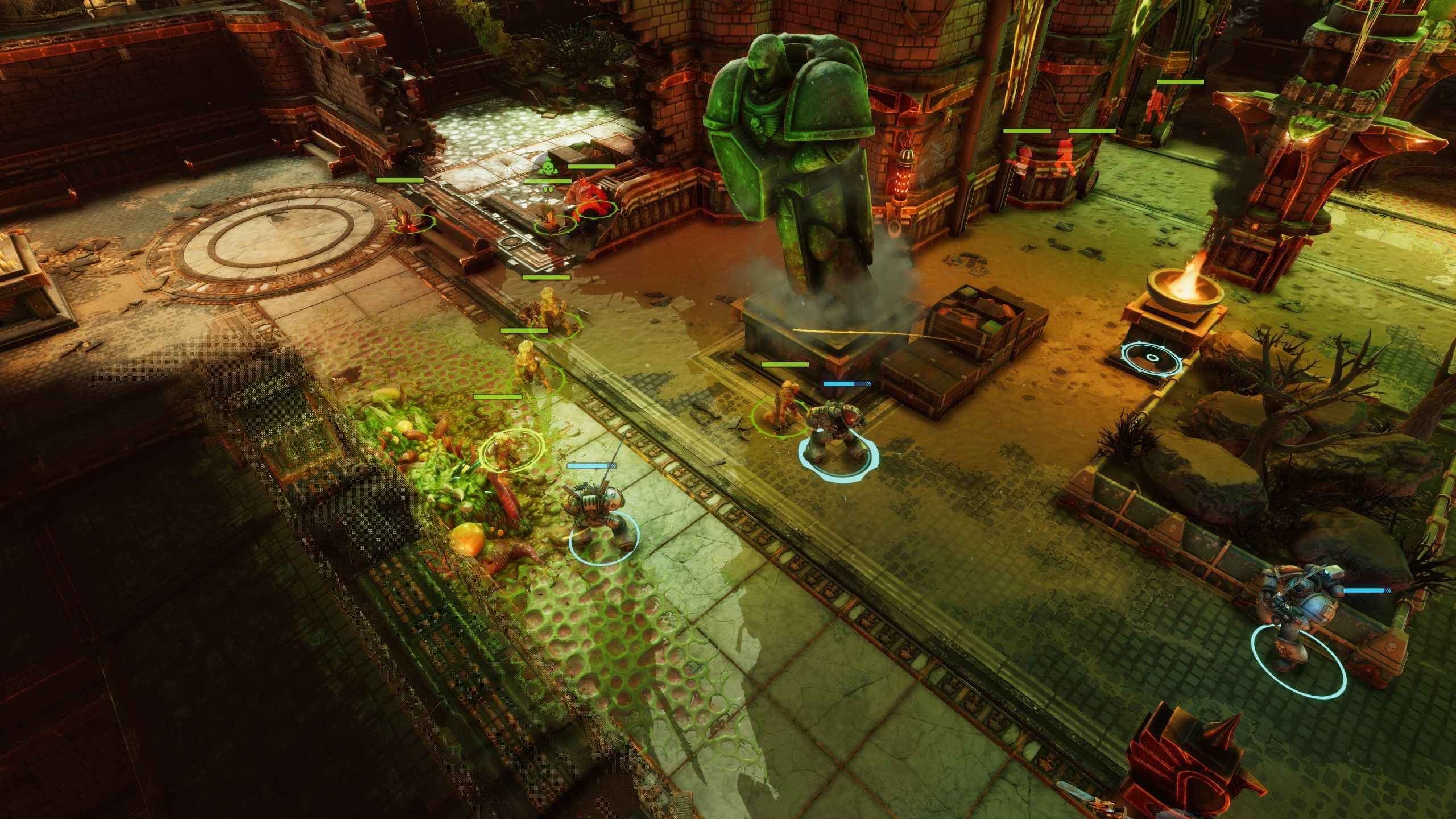
There'll be times when Ectar will insist on observing Grey Knight traditions, such as organised fights between Marines or even dedicated days of meditation. Going through with these rituals will boost morale and grant XP boosts for your Marines, but frustrate the single-minded Inquisitor, causing you to suffer a penalty to research speed. You couldn't have picked a less compatible group of people, but even though they're all too embroiled in their personal missions to see the bigger picture, they're well characterised through solid writing, plentiful dialogue options, and surprisingly expressive cutscenes and animation. And hanging over the onboard politics are your regular reports to the Grand Master, with whom you'll need to tread carefully in order to secure upgrades to recruits and equipment.
It's pretty much the core system of the board game Pandemic—which any fan will attest is masterful at generating tension.
The greatest overarching threat is the Bloom, the Nurgle-driven disease which breaks out at regular intervals on random star systems as you travel between them. Should you fail to reach an outbreak on time and quell it with your marine squad, that planet will gain a point of Corruption, which will make future missions there harder and increase the likelihood of Bloom spreading to neighbouring systems.
It's pretty much the core system of the board game Pandemic—which any fan will attest is masterful at generating tension. With that as a foundation, and the fact that your ship is seriously under-equipped at the start of the game, it makes every passing in-game day, every trip across the galaxy, and every decision to side with one crewmate or another, a tough one that will invariably have consequences.
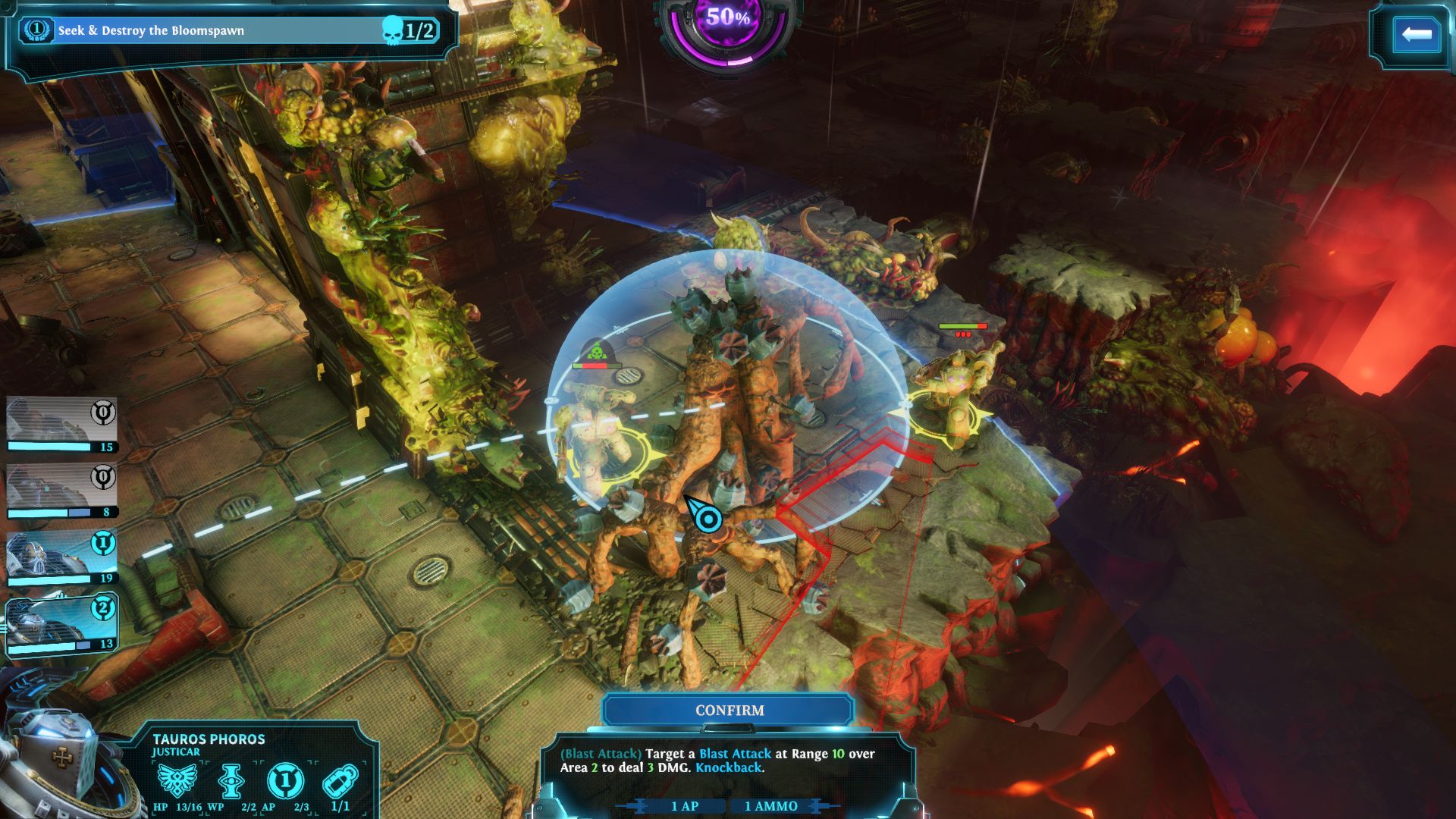
Both tension and Bloom trickle down onto the battlefield like a loathsome fungal rot soaks through soil to attack the roots of a tree. Once you deploy your squad of Grey Knights on a Blooming planet, you get down to the turn-based battle part of the game. The more blips of Bloom on a planet, the harder the mission objectives, the more mutations enemies start with, and the more 'Gifts' that Nurgle can bestow to them during battle—whether it's covering the ground with plague tiles or calling in reinforcements through Warp Gates.
Bloom-infested planets will look different too, and I spent a good bit of time sweeping over battlefields to admire the eye-filled flora, tentacles and other pustulent masses that crop up. To top it all off, a 'Warp Surge' meter ticks up every turn, giving enemies nasty visible mutations like tentacles, horns and classic Nurgle gut-mouths, granting them various status boosts. The Bloom's effects on both enemies and environments are deliciously vile.
It all sounds a bit overwhelming, and indeed when enemies break out in boon-granting diseases, defeated cultists and Plague Marines rise from the dead or Graven Poxwalkers burst from the sickly ground, it can feel that way for a bit. The early going is tough, especially as your marines pick up injuries that usually won't have healed by the next time you head into battle. But once you get to grips with the impressive depth of tactical possibilities at your disposal, things really starts to click for you and your marines.
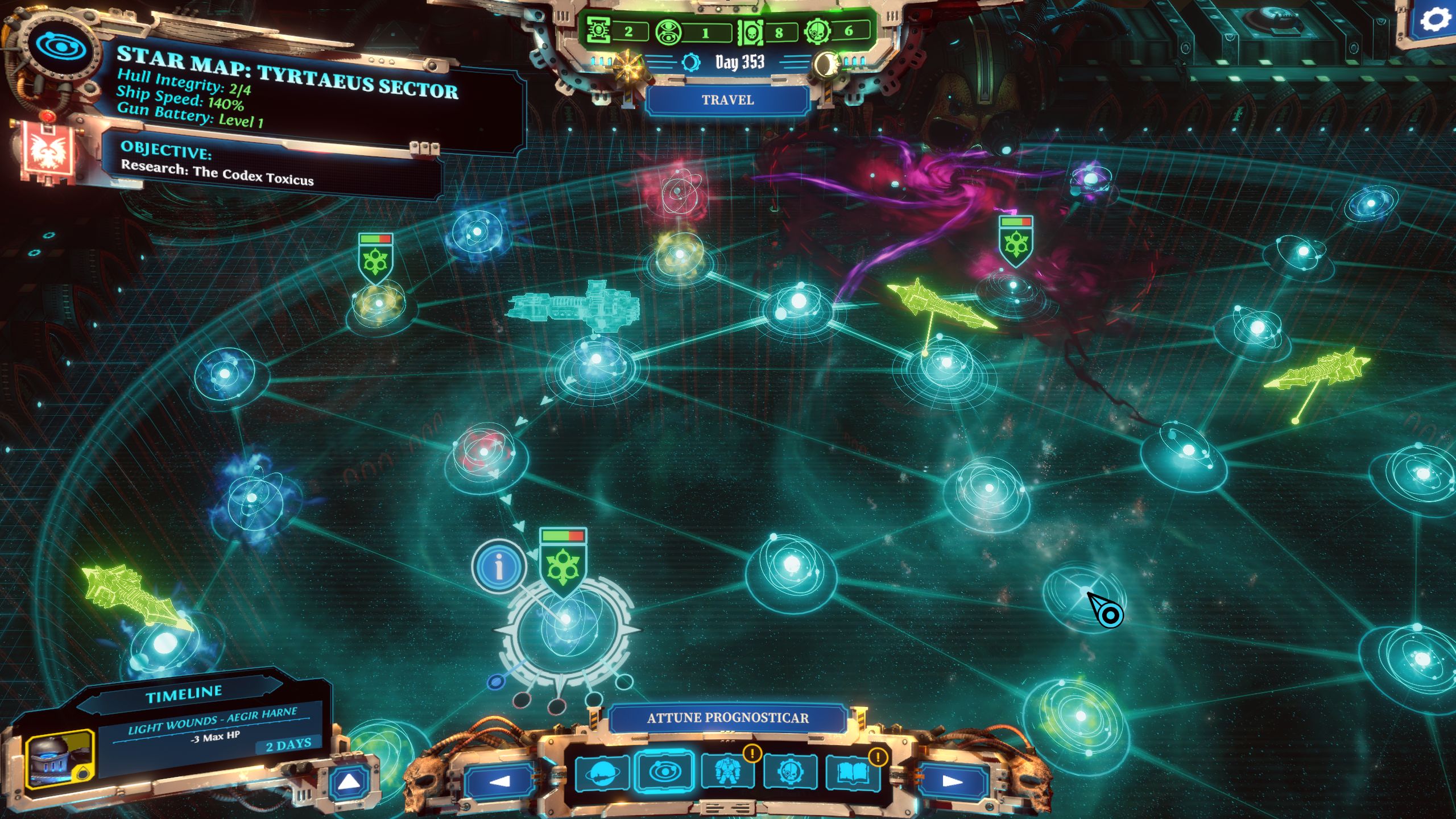
The environments, for a start, are a delight of destructible potential. Beyond the obligatory explosive ammo caches and fire pits, there are pillars to topple onto enemies and bridges to destroy—single moves capable of swinging a skirmish your way. Particularly impressive is the fact that most walls can be blown up, which adds a layer of volatility to even the best-planned moves. At one point, I pushed a column onto a line of four enemies, one of whom was sent flying into an ammo crate. As I power-fisted the air in ecstasy and the smoke cloud dissipated, I saw that I'd also blasted away a portion of wall, causing an enemy patrol from next door to come streaming in and putting an abrupt end to my celebration.
Combat has some classic XCOM foundations, from darting between partial and full cover, to action points and core abilities like Overwatch. But beyond that it very much carves its own path. There's almost no RNG, for a start, and what's the point of relying on cover when that cover may well be blown away in the next turn? Similarly, the rich interplay of the Grey Knights' classes and abilities meant that before long I'd all but forgotten that Overwatch—that trusty if fusty hallmark of the genre—even existed.
Take my Interceptor, Voldred Storm, who I trained into an elusive dual-wielding ninja with self-replenishing Action Points. Using Teleport Strike, I could seriously damage several enemies in a single AP, give that AP an 80% chance of automatically replenishing, then continue to tear up enemies deep behind their lines. Lacking Terminator Armour, Voldred is something of a glass cannon, but I addressed that with my Justicar, who could bolster his own armour, then psychically send all of it to Voldred for one turn, making him ready to receive his inevitable battering.
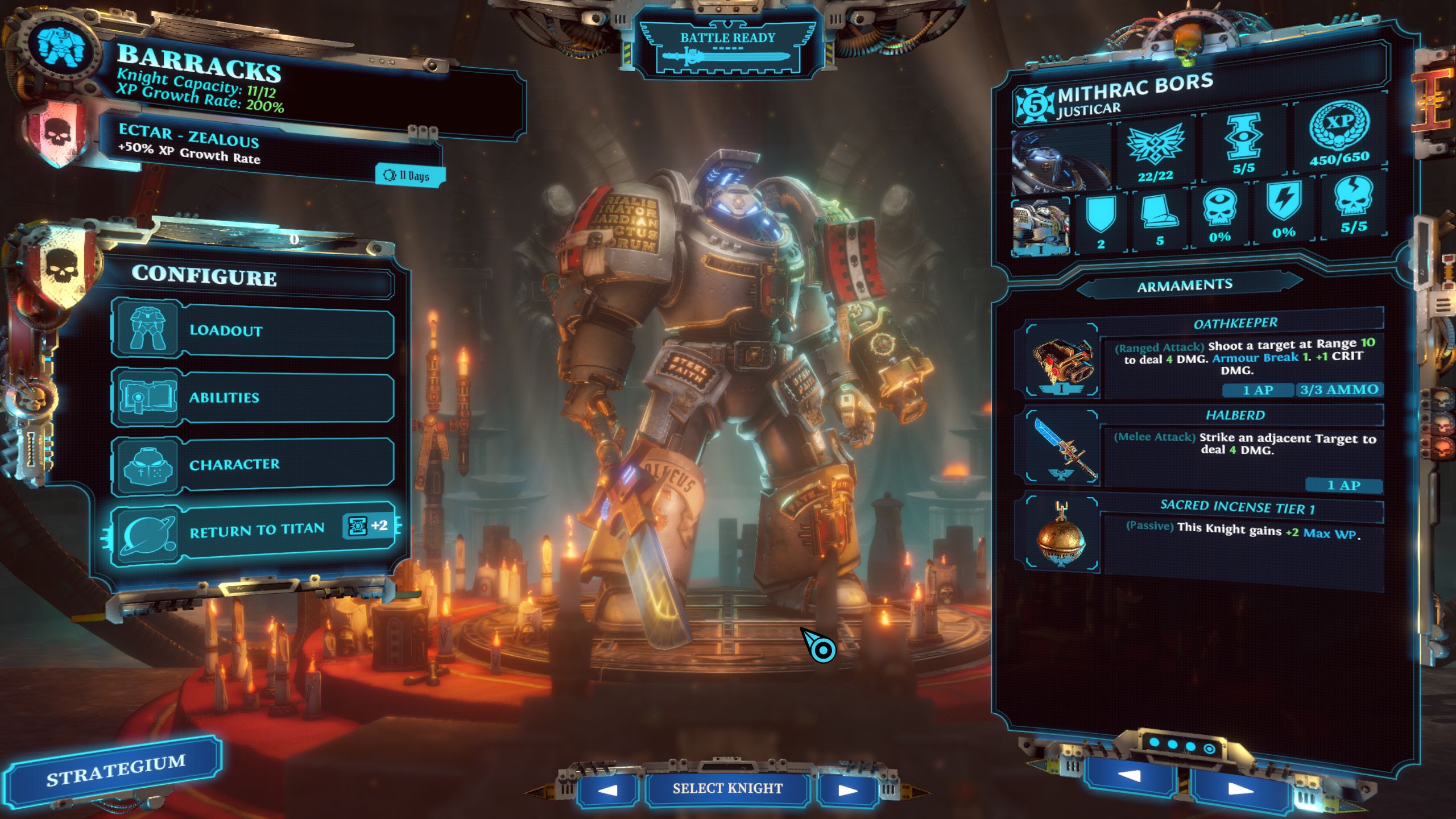
You can set enemies burning and bleeding, and use grenades or psychic abilities to send them into frenzies where they attack their own team. Stack that with an abundance of upgradeable wargear, weapons and armour, and there's bountiful room for build experimentation and metaplay.
There's always a trade-off in Daemonhunters—a niggling Nurgle negative to counter the positives.
But there's always a trade-off in Daemonhunters—a niggling Nurgle negative to counter the positives. Fancier psychic abilities use Willpower, which upon use tick up the Warp Surge meter, inching it towards mutations and other muculent gifts for the enemy. To counter these, you can research Stratagem cards, which let you do one-off things like teleporting your whole squad to one location or getting an enemy to fight on your side for three turns.
There are so many nice touches that flesh out Daemonhunters: the targeting of specific body parts, executions, text-based spaceship battles, bionic enhancements for marines critically injured in combat, and Prognosticars that you strategically place on the star map to inhibit Bloom growth and get bonuses in various star systems. All these little threads are tightly woven together into the story and play experience, feeling neither excessive nor superfluous.
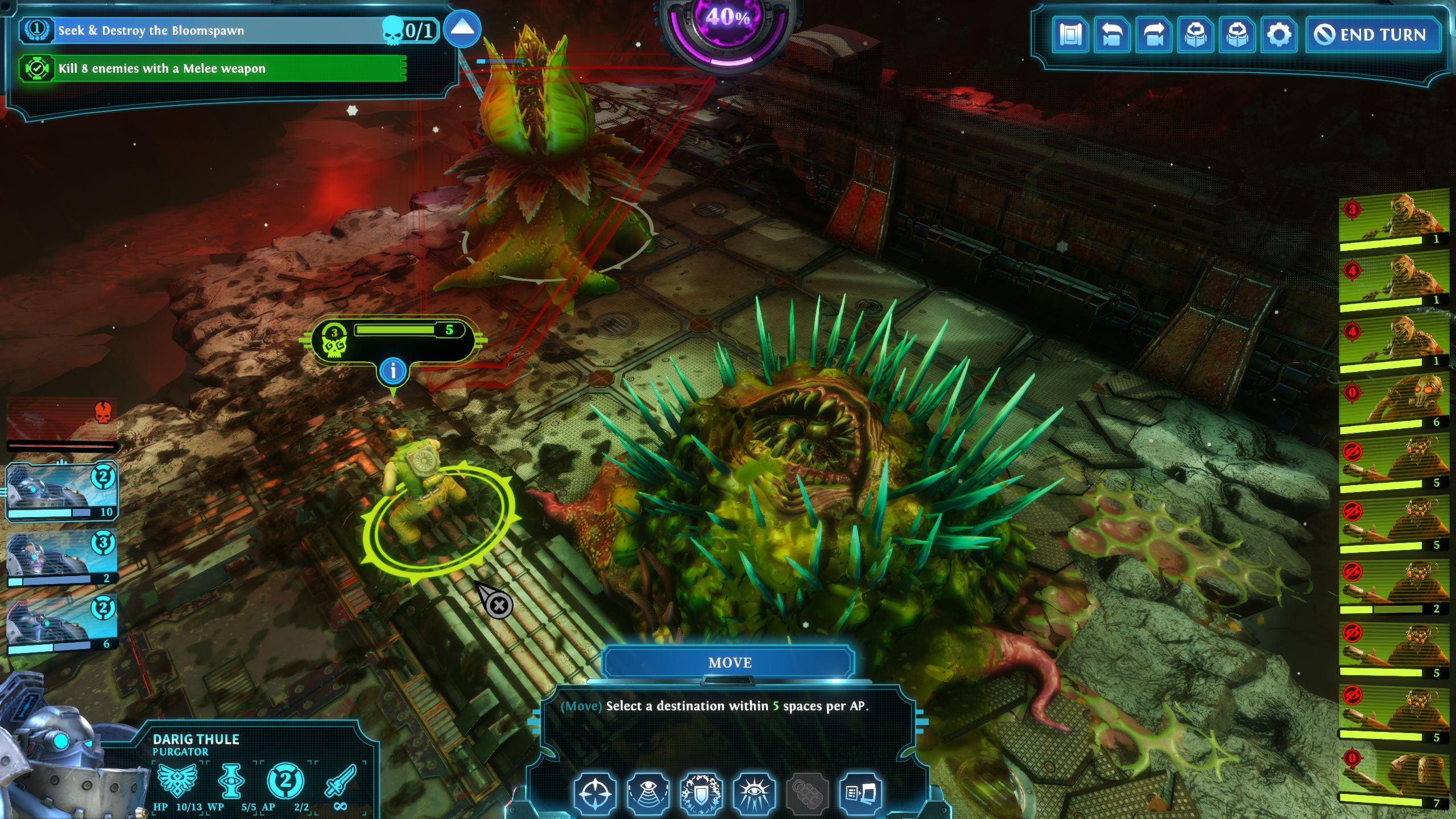
Daemonhunters is not without a few frustrations. Enemy AI isn't too bright, often resorting to Overwatch in seemingly random directions instead of, say, shooting explosive nodes when you take cover behind them. There could be a bit more clarity in certain mission objectives too. Crucially, It was pretty poorly optimised on my setup, with sluggish framerates that don't respond even to drastic decreases in graphics settings, as well as some slowdowns between missions that can only be fixed by restarting the game.
With all that said, I imagine fledgling developer Complex Games will patch these issues up sooner rather than later. It would be foolishness bordering on heresy if they didn't, because they've created a bit of a gem here—one that smashes through its safe pre-release image as 'Warhammer 40K meets XCOM' to plant the seeds for its own series. Likewise, it breaks away from the austere stylings of 40K with a vivid, meaty art style that makes corrupted levels and enemy units ooze with character (as well as plenty of pus and bile). Where Daemonhunters could so easily have been 'yet another 40K game' or 'yet another XCOM-like,' it emerges as one of the best offerings on both fronts.
A layered and engaging space opera that triumphs both on and off the battlefield.
Robert is a freelance writer and chronic game tinkerer who spends many hours modding games then not playing them, and hiding behind doors with a shotgun in Hunt: Showdown. Wishes to spend his dying moments on Earth scrolling through his games library on a TV-friendly frontend that unifies all PC game launchers.
